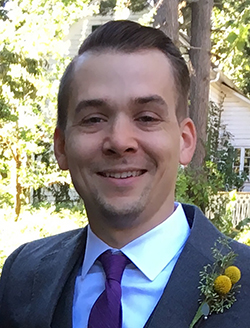Brain Tumor Survivor
Do What Fulfills You and Enjoy Life
 After being diagnosed in 2008 with a glioblastoma, Dr. PJ Lukac had no idea his experience would lead him to make so many new friends. As a survivor, he knows his situation is rare, but he has dedicated his time to helping other brain tumor survivors. He finished medical school and now works in the neonatal and pediatric section of the intensive care unit in a hospital in his home town.
After being diagnosed in 2008 with a glioblastoma, Dr. PJ Lukac had no idea his experience would lead him to make so many new friends. As a survivor, he knows his situation is rare, but he has dedicated his time to helping other brain tumor survivors. He finished medical school and now works in the neonatal and pediatric section of the intensive care unit in a hospital in his home town.
I was in medical school in New York when I began to feel like something was off. During the fall semester, I started to have these episodes where I lost the ability to concentrate for a few minutes. Oddly enough, while this was happening, I would get a song stuck in my head that I didn’t know. These experiences lasted about two to three minutes. After the feeling passed, I wouldn’t feel like myself for awhile. I had difficulty recalling words and would get headaches at 4 a.m. that were not relieved by over-the-counter medications.
After these symptoms continued for about three months, I told my parents. I thought I was experiencing a psychiatric problem because I also was feeling more anxious and depressed. I learned later that I was having sensory seizures. My mother suspected right away that the problem wasn’t psychiatric in nature. When I came home to Chicago during winter break, she insisted I see a neurologist. Ironically, I had just completed a class that semester on neuropathology, which is the study of brain tumors.
The neurologist performed an electroencephalogram, which is used to find problems with the electrical activity of the brain, and an MRI the same day. After the first MRI sequence was done, the technician asked me if I’d had an MRI previously. I said no, and he said he wanted to take me to a different room for another scan. With the medical background I had, alarm bells began to ring. My parents were brought in, and the neurologist told us that I had a brain tumor.
Everything happened so fast. It never crossed my mind that I could have a brain tumor. After we were told, I went straight to the emergency room. Three days later, I had surgery to remove the tumor, which was located in the left frontal temporal lobe. That is the area that controls memory and emotions. I felt much better after the surgery. I only spent a couple of days in the hospital and just had to deal with a really bad headache for about a week. I haven’t had any seizures since the surgery.
After the surgery, the tumor, which was the size of a golf ball, was sent to pathology. The pathologist determined it was a glioblastoma. Although I didn’t get a second opinion before I had the surgery, I wanted a second opinion on the pathology of the tumor. I had it sent to my medical school in New York. The pathologist thought it might be a rare type of tumor, although still malignant. I got a third opinion, and that pathologist thought it could be a rare form of glioblastoma, a lipid-rich variant. A few years after being diagnosed, I discovered that my tumor actually became part of a study that examined the genetics of glioblastomas, which was published in the New England Journal of Medicine. From that study, I learned that my tumor had favorable genetic characteristics.
Following the surgery, I had radiation therapy for 28 days to make sure no cancer cells remained. After that, I did chemotherapy for nine months.
The radiation therapy caused me to lose my hair, which was quite traumatic for me as a young man. It also caused some fatigue. The chemotherapy drugs dried out my skin and gave me some nausea and neutropenia, but fortunately, I didn’t get sick. The high-dose steroids made me chubby and gave me a beer belly and acne, but that all cleared up once I was off the medication. I was really very fortunate.
I put medical school on hold because I wasn’t sure about my recovery. The median survival after glioblastoma is around 15 months. If I only had 500 days left to live, I wanted to do the things I’d dreamed of doing. I took a year off from school because of treatment. But I didn’t worry about the rest of my life. I explored new hobbies, including taking guitar lessons, traveling and making many new friends.
Ironically, after I decided to go back to school, I met my future wife. We were paired up together in a clinical class, and she had been in the class below me. If the cancer had not happened, I may not have met her. Even after everything I went through, I’m not sure I’d change anything that happened.
My sister helped get me involved with the American Brain Tumor Association through a fundraising run in Chicago. I dedicated a lot of my energy to that cause. In one year, I got a team together, and we raised $125,000. I met so many great people through the organization, including others with brain tumors. I put the good medical knowledge I already had to use helping others going through similar experiences.
There is so much uncertainty with cancer, but you cannot let it consume you. It’s a part of your life, but it is just a small part of your life. Keep an open mind, and seek a second opinion. Live your life. Do what fulfills you, and enjoy life.


